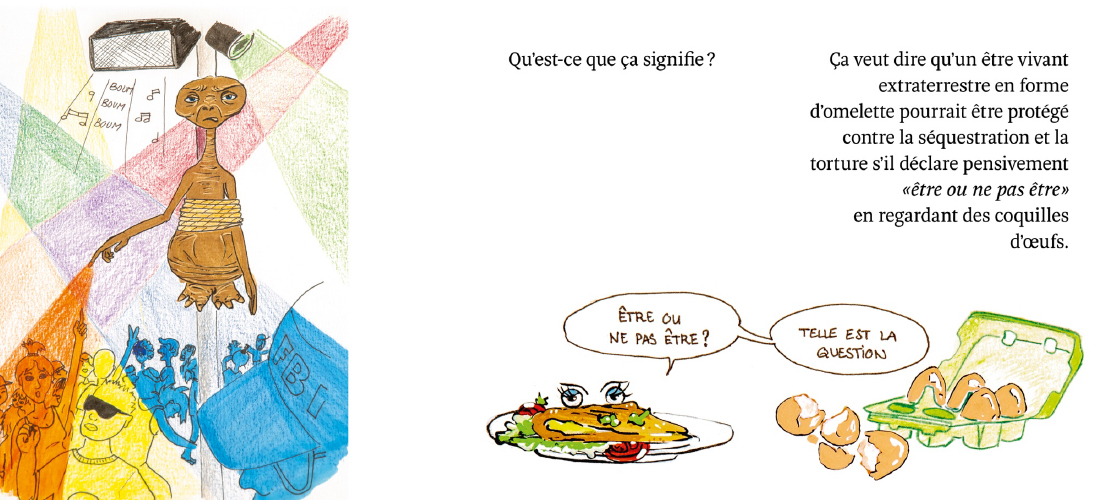Path
Funny subject, especially when it is initiated by a lawyer. Erasmus Guyot, born in Lausanne in 1976, could have thrown himself wholeheartedly into horseback riding or the arts as part of his family, or chosen to become an eminent architect like his father or an economist like his mother. It was to be the law, with first of all a law degree in the canton of Geneva and then a doctorate at the University of Paris1 Panthéon Sorbonne.
European Space Law (Editions Helbing&Lichtenhahn/Bruylant), a first very serious book, then an article on Le droit face à la possibilité de la vie dans l’espace in the Revue française de droit aérien et spatial (Editions Pédone).
A nice thumbnail sketch of the secret world of space and its discoveries.
Why did you choose the law? and more particularly an orientation for space law?
As far as the law was concerned, I wanted to study something to which my education did not naturally lead me and in which I had no knowledge. The humanities have always interested me and I expected them to help me understand the world in which we live.
I then chose space law out of curiosity as an option for a post-graduate degree in international trade law, and then went further into the subject to study trade from the point of view of WTO law, and went on to write a thesis on the subject.
Space law governs human activities in outer space. It is therefore a projection of human organization in space, a confrontation of our way of life and our thinking with an infinite hostile environment, but which is perhaps the natural environment of our evolution. For example, the question of respect for intellectual property takes on a new dimension when a work is broadcast by satellite. The rules of responsibility are disrupted because of the space environment, the relative mastery of the technology used to reach it and the actors in space activities which, until now, have mainly been States. While space law defines cosmonauts, astronauts, astronauts or taikonauts as “envoys of humanity”, thus symbolically representing all the inhabitants of our planet, this appellation can be questioned now that private actors are carrying out space activities. The sovereignty of States stops at their airspace, but how is this sovereignty projected on the orbits that overhang States or on spacecraft? Is our definition of the animal and plant kingdom still valid on the scale of life that could exist in the universe?
Space law, like space activities, may seem far removed from our daily concerns, but in reality it extends horizontally to multiple fields of law, in the same way that we all benefit from satellite communications and positioning.
How do you become a lawyer for the European Space Agency? It’s a position we imagine it is very coveted! What were your motivations for applying for it?
There seems to be a large number of candidates in general to work at ESA (European Space Agency), but I can’t really tell you if this is a very coveted position, as most people know less about ESA than NASA and seem to have difficulty understanding what my job involves.
I was embarking on a career in banking and commercial law in Geneva, but a skiing accident changed my priorities. I realized that the conflicts that punctuate a lawyer’s life would eventually get to me, and that I would move from one to the other like a monkey from branch to branch. I was more interested in participating in an adventure whose purpose I fantasized about.

Excerpts from the Book “The Rights of Aliens”, illustration by Audrey Guyot
What exactly is your role in this intergovernmental body?
I am in charge of launcher-related contracts, mainly those for launch services for ESA programs. This means that, together with engineers and financiers, I issue calls for tenders, then negotiate and conclude contracts to launch ships into space. I say “spaceships” because they are most often satellites, but sometimes they are also vehicles to other planets. To take a recent example, ESA has just signed a contract with Arianespace to launch the JUICE spacecraft – for Jupiter Icy Moon Explorer – which will be launched in 2022 from Kourou in French Guiana, then revolve around the Earth, then Venus, then Mercury, then Mars, and finally have enough energy to go in 2029 to Jupiter and its ice moons to examine their composition, and in particular whether any form of life could have developed there. Sometimes, this involves launching satellites around the Earth for observation purposes, as in the case of Copernicus, the European Union’s program, for navigation such as Galileo, or for telecommunications. Most often, therefore, these are activities that extend over a very long period of time.
Tell us about the objectives of the European Space Agency, what are its missions?
The Agency, more commonly known as ESA (European Space Agency), carries out space activities on behalf of its 22 member states for exclusively peaceful purposes. It was founded in 1975 and is not an institution of the European Union. Switzerland is one of its founding states. This means that, on the proposal of its Director General, of course assisted by a cohort of scientists, the Member States finance space research and development programs in a wide variety of fields, ranging from scientific activities such as the exploration of the universe and planets, observation with the launch of remote sensing satellites to scan the earth’s surface and its atmosphere, satellite positioning such as Galileo to provide new services to Europeans, electronic communications by satellite, development of launchers (rockets), etc. Some activities are carried out within ESA and others are acquired from European companies under contract with the Agency.
The European Space Agency is an intergovernmental organization composed of 22 countries. I imagine that for some countries the economic stakes are more important than the development of space regulations. How can they be involved?
Law is a human science that governs human activities, so it always succeeds the activities themselves, unless one is anticipatory. It is therefore normal for States to have geopolitical, scientific and economic concerns before legal concerns. I do not establish regulations to constrain space activities, but I arrange the legal conditions to allow the activities to be carried out for the benefit of the parties involved, like any lawyer in business law. I approach space law through commercial law, but keeping in mind the particularity of the space environment and its actors in order to take the necessary height to put the legal rules into perspective. What is the purpose of the contract? What can reasonably be asked of the parties involved? What is the inherent and acceptable risk? How is it taken into account? etc. It is a question of constructing a classical legal reasoning on an unusual activity.
We talk about pollution, overpopulation, do you think that one day we will all have to go and live in space?
Space, which for the moment knows no boundaries and whose resources seem limitless, seems to allow infinite growth and thus meet our natural need for development. The taste for adventure towards the unknown also appears to me as a fundamental trait of the human species. The challenges related to the development of the technology necessary for the exploration of space are as many opportunities for peaceful international collaboration. Space thus meets many of our needs. But the Earth is our flagship for space travel, so we have no chance of survival if we are not able to preserve it. We live nowhere as well as on Earth.
How did you get the idea to write the book “The Rights of Extraterrestrials”?
Thanks to the poetry of the drawings and the humorous tone of the texts, this book is very public, was it a wish?
It is not excluded that an extraterrestrial life form may be discovered in my lifetime. While taking an interest in it, I realized that the legal status of extraterrestrial life was not addressed by jurists, no doubt because this question raises several taboos, notably religious, but also linked to the thinking of jurists themselves, who are conservative by nature and find it difficult to confront the right to speculation. Lawyers often have down-to-earth minds. However, we must remember the Valladolid Controversy in which, in the 16th century, theologians and jurists wondered whether the inhabitants of the colonized lands of the New World had a soul and should be able to benefit from the protection of the church. This debate took place after decades of massacres. Thinking back half a millennium, it is obvious that the church and the conquistadors should have thought before they set out to sea about how they would deal with the inhabitants of these new lands. I thought that we should learn from our history and look ahead. This approach seemed all the more relevant to me because it raises the question of our otherness from our own point of view, and therefore of what constitutes us as human beings in law. By treating it on the scale of the universe, we demonstrate even more clearly the absurdity of all forms of discrimination on Earth. It also addresses the animal condition. These questions seem to me fundamental to the evolution of our species on Earth and in the universe. As they are universal, I thought it was necessary to leave the scientific legal field and to popularize my subject as much as possible. In order to go beyond the aridity of the law, I tried to seduce as wide an audience as possible with humor and derision.

© Illustration by Audrey Guyot
This book was made in collaboration with your wife who created the drawings, how was the development of the book? Do you write she draws or is it the opposite?
I wrote the story and then got down to the drawings. I then submitted them to Audrey in a state of a quagmire so that she could put them in color and complete them if necessary. The result is most conclusive when I just make sketches on which she can give free rein to her creativity. It has been a very fun experience working together on this book and we have agreed to make a second volume if we find the time.
So, do aliens exist? Are they as harmless as those depicted in your book?
Yes I think that aliens exist! The first ones that we will discover may be simple earthworms. And Claude Nicollier answered positively to this same question. If they already know us and have not colonized us, it is because they are already wiser than us. Otherwise, all speculation is permitted and thinking about it makes my daily life more acute.
